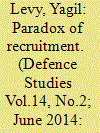| Srl | Item |
| 1 |
ID:
124361


|
|
|
|
|
| Publication |
2012.
|
| Summary/Abstract |
The People's Republic of China was formally founded in October 1949, only eleven months after the state of Israel. Although situated on opposite ends of the Asian continent, both nations began as poor, agrarian societies, early in their formation facing many similar challenges such as territorial threats. However, the geographic distance between the Middle Kingdom and the Holy Land, their location vis-à-vis Europe and the West, and their contrasting experience with the former colonial powers decisively influenced their world outlook, keeping these two countries at arm's length for decades. The United States in particular played a decisive role as an impediment to the natural growth of a stronger relationship between these two ancient nations that have much in common. Now, as China and Israel complete the twentieth year of diplomatic relations, and as the Sino-Israeli relationship appears more independent from American influence than ever before, the two nations are finally poised to explore the abundance of synergies that bind them through deeper and broader interaction and a shared goal of bringing those benefits to the wider world.
|
|
|
|
|
|
|
|
|
|
|
|
|
|
|
|
| 2 |
ID:
124354


|
|
|
|
|
| Publication |
2012.
|
| Summary/Abstract |
There was no shortage of intelligence, nor was there a lack of intelligence alerts about the Yom Kippur War. The reasons for the famous mechdal (Israel's lack of preparedness for the war) should be judged in the context of the 1973 conditions and not according to "what if…" questions. The reasons are, first, the unhealthy mixture of the military top echelon with the political leadership, which prevented the chief of staff from carrying out the appropriate military preparations on October 6, 1973. The second reason for the mechdal was a successful disinformation operation conducted by the Russians and their Arab allies. The third and main reason was the Israeli fear of "losing" the Americans-an outcome, the Israelis anticipated, of the struggle for the freedom of Soviet Jewry. For the Israeli public the war was a surprise; not for the political leadership.
|
|
|
|
|
|
|
|
|
|
|
|
|
|
|
|
| 3 |
ID:
129959


|
|
|
|
|
| Publication |
2014.
|
| Summary/Abstract |
This article compares six cases between the US and Israel in the areas of anti-war mobilization and its impact on military deployment, force protection, and prisoners' swap. It argues that the more the recruitment is built on state-coercion rather than market regulation, the higher the state's sensitivity to the well-being of its soldiers because the likelihood for collective action focused on military issues is higher. The power of republican discourse, the coercion of recruitment on powerful, but sometimes also unwilling enlistees, and the favoring of voice over exit all cause the state to increase its commitment to its soldiers. At the extreme, the state may even favor soldiers' lives more than its commitment to protect the citizens.
|
|
|
|
|
|
|
|
|
|
|
|
|
|
|
|